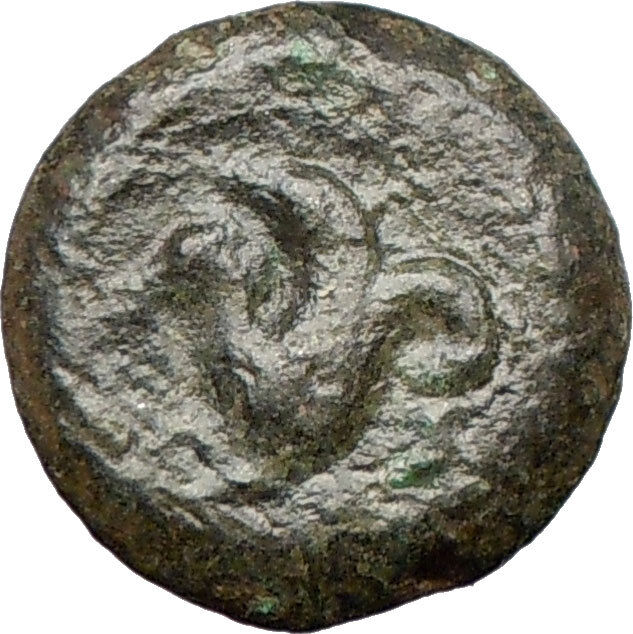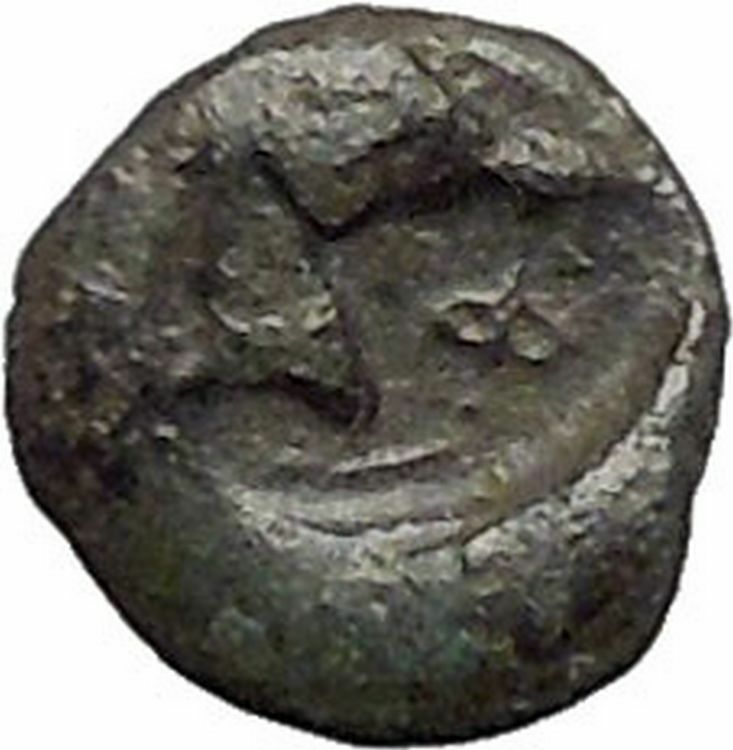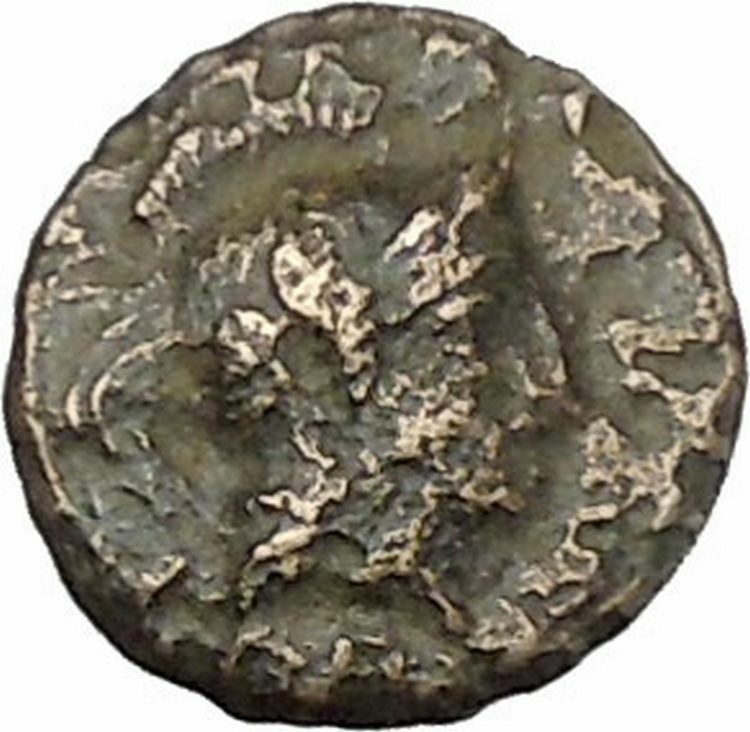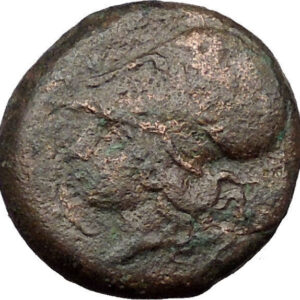|
Greek city of Klazomenai in Ionia
Bronze 12mm (1.06 grams)
Struck 387-300 B.C.
Reference: Mionnet 52
Laureate head of Apollo left.
Swan left, wing open, with neck curled back onto itself.
Situated on the southern shores
of the Gulf of Smyrna, Klazomenai was the birthplace of the philosopher
Anaxagoras.
You are bidding on the exact item pictured,
provided with a Certificate of Authenticity and Lifetime Guarantee of
Authenticity.
Klazomenai (also spelled Clazomenae,
Greek
:
Κλαζομεναί
, modern-day Kilizman in
Urla
near İzmir
in
Turkey
) was an
ancient Greek city of Ionia
and a member of the
Ionian Dodecapolis
(Confederation of Twelve Cities), it was one of the first
cities to issue silver coinage.
//

Map of Aegean side of Anatolia showing the location of Klazomenai
Klazomenai is located in modern Urla (Vourla in Greek) on the western
coast of Anatolia
, on the southern coast of the
Gulf
of İzmir
, at about 20 miles west of İzmir. The city was originally located
on the mainland, but probably during the early fifth-century
Ionian Revolt
from the
Persians
, it was moved to an island just off the coast, which
Alexander the Great
eventually connected to the mainland with a causeway.
The location of the city-around a harbour, backed by a coastal plain and low
hills to the south provided a number of locations for settlement, and as such,
settlements did shift from location to location over time. This can be shown by
the island of Karantina, located to the north of the settlement area-which
became settled at certain points in the history of Klazomenai.
Mythology
The principal god of the city was
Apollo
.
According to myth, swans drew the chariot in which Apollo every year flew south
from his winter home in the land of the
Hyperboreans
. But Klazomenai was also home to large numbers of swans, and it
is thought that the verb klazo was used to describe the call of the wild
birds. The swan on the obverse is both an attribute of
Apollo
and a
pun on the name Klazomenai.
Ancient
times
Though not in existence before the arrival of the
Ionians
in
Asia, its original founders were largely settlers from
Phlius
and
Cleonae
. It
stood originally on the
isthmus
connecting the mainland with the peninsula on which
Erythrae
stood; but the inhabitants, alarmed by the encroachments of the
Persians
, removed to one of the small islands of the bay, and there
established their city. This island was connected with the mainland by
Alexander the Great
by means of a pier, the remains of which are still
visible.
During the 5th century it was for some time subject to the
Athenians
, but
about the middle of the
Peloponnesian War
(412 BC) it revolted. After a brief resistance, however,
it again acknowledged the Athenian supremacy, and repelled a
Lacedaemonian
attack. In 387 BC Klazomenai and other cities in Asia were
taken over by
Persia
, but the city continued to issue its own coins.
Under the Romans Clazomenae was included in the province of Asia, and enjoyed
an immunity from
taxation
.
Klazomenai is today perhaps best-known as the birthplace of the philosopher
Anaxagoras
,
often styled “Anaxagoras of Clazomenae”.
Archaeology
The site of Liman Tepe, which lies near an old harbor contains very important
Bronze Age excavations, the most prominent and remarkable of which is the amount
of varying archaic burial sites, as well as evidence of the practises associated
with them close by. One possible explanation for this is that these sites were
used by different social groups within society.
The city was famous for production and exports of olive oil and its painted
terracotta
sarcophagi
, which are the finest monuments of Ionian painting in the 6th
century BC.
It was also prized for its variety of
garum
.
Ancient
olive press
Olive oil extraction
installation (işlik) dating back to the third
quarter of the 6th century BC uncovered in Klazomenai is the only surviving
example of a level and weights press from an ancient Greek city and precedes by
at least two centuries the next securely datable earliest presses found in
Greece. It
was restored and reconstructed in 2004-2005 through collaboration between
Ege
University
, a Turkish olive-oil exporter and a
German
natural building components company, as well as by local artisans, on the basis
of the clearly visible
millstone
with a cylindrical roller and three separation pits. The olive oil obtained
turned out to be quite a success in business terms as well.
|
|
restoration and reconstruction
|
|
general view after completion of works
|
Financial
pioneers
In an event noted by
Aristotle
,
Klazomenians also appear as financial pioneers in
economic history
, for having used one
commodity
(olive oil), in an organized manner and on a city-scale, to purchase
another (wheat), with
interests
refundable on the value of the first. Around 350 B.C., suffering
from a shortage of grain and scarcity of funds, the rulers of the city passed a
resolution calling on citizens who had stores of olive oil to lend to the city
at interest. The loan arranged, they hired vessels and sent them to ports of
exportation of grain and bought a
consignment
on the pledged security of the value of the oil.
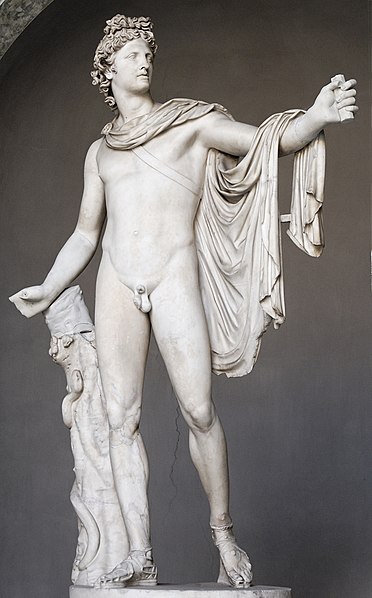
Apollo Belvedere
,
ca. 120–140 CE
Apollo is one of the most important and complex of the
Olympian deities
in
ancient Greek
and
Roman religion
,
Greek
and
Roman mythology
, and
Greco
–Roman
Neopaganism
. The ideal of the
kouros
(a beardless, athletic youth),
Apollo has been variously recognized as a god of light and the sun, truth and
prophecy, healing, plague, music, poetry, and more. Apollo is the son of
Zeus and Leto
, and has a twin sister, the chaste
huntress Artemis
. Apollo is known in Greek-influenced
Etruscan mythology
as Apulu.
As the patron of Delphi
(Pythian Apollo), Apollo was an
oracular
god—the prophetic deity of the
Delphic Oracle
. Medicine and healing are
associated with Apollo, whether through the god himself or mediated through his
son Asclepius
, yet Apollo was also seen as a god
who could bring ill-health and deadly
plague
. Amongst the god’s custodial charges,
Apollo became associated with dominion over
colonists
, and as the patron defender of herds
and flocks. As the leader of the
Muses (Apollon Musegetes) and director of their choir, Apollo
functioned as the patron god of music and poetry.
Hermes
created the
lyre for him, and the instrument became a common
attribute of Apollo
. Hymns sung to Apollo were
called paeans
.
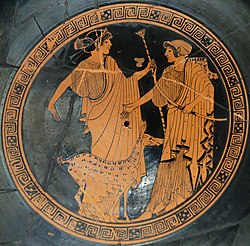
Apollo (left) and
Artemis
.
Brygos
(potter signed), Tondo of an
Attic red-figure cup c. 470 BC,
Musée du Louvre
.
In Hellenistic times, especially during the 3rd century BCE, as Apollo
Helios he became identified among Greeks with
Helios
,
Titan
god of the sun
, and his sister Artemis
similarly equated with
Selene
, Titan
goddess of the moon
In Latin texts, on the
other hand,
Joseph Fontenrose
declared himself unable to
find any conflation of Apollo with
Sol
among the
Augustan poets
of the 1st century, not even in
the conjurations of Aeneas
and
Latinus
in
Aeneid
XII (161–215). Apollo and Helios/Sol
remained separate beings in literary and mythological texts until the 3rd
century CE.
Origins

The Omphalos
in the Museum of
Delphi
.
The cult centers of Apollo in Greece,
Delphi
and
Delos
, date from the 8th century BCE. The Delos
sanctuary was primarily dedicated to
Artemis
, Apollo’s twin sister. At Delphi,
Apollo was venerated as the slayer of
Pytho
. For the Greeks, Apollo was all the Gods
in one and through the centuries he acquired different functions which could
originate from different gods. In
archaic Greece
he was the
prophet
, the oracular god who in older times
was connected with “healing”. In
classical Greece
he was the god of light and of
music, but in popular religion he had a strong function to keep away evil.
From his eastern-origin Apollo brought the art of inspection from “symbols
and omina
” (σημεία και τέρατα : semeia kai
terata), and of the observation of the
omens of the days. The inspiration oracular-cult was probably
introduced from Anatolia
. The
ritualism
belonged to Apollo from the
beginning. The Greeks created the
legalism
, the supervision of the orders of the
gods, and the demand for moderation and harmony. Apollo became the god of
shining youth, the protector of music, spiritual-life, moderation and
perceptible order. The improvement of the old
Anatolian
god, and his elevation to an
intellectual sphere, may be considered an achievement of the
Greek
people.
Healer and
god-protector from evil
The function of Apollo as a “healer” is connected with
Paean
, the physician of the Gods in the
Iliad
, who seems to come from a more
primitive religion. Paeοn is probably connected with the
Mycenean
Pa-ja-wo, but the etymology is the
only evidence. He did not have a separate cult, but he was the personification
of the holy magic-song sung by the magicians that was supposed to cure disease.
Later the Greeks knew the original meaning of the relevant song “paean”. The
magicians were also called “seer-doctors”, and they used an ecstatic prophetic
art which was used exactly by the god Apollo at the oracles.
In the Iliad, Apollo is the healer under the gods, but he is also the
bringer of disease and death with his arrows, similar to the function of the
terrible
Vedic
god of disease
Rudra
.He sends a terrible plague to the
Achaeans
. The god who sends a disease can also
prevent from it, therefore when it stops they make a purifying ceremony and
offer him an “hecatomb” to ward off evil. When the oath of his priest appeases,
they pray and with a song they call their own god, the beautiful Paean.
Some common epithets of Apollo as a healer are “paion” , “epikourios”,
“oulios”, and “loimios” . In classical times, his strong function in popular
religion was to keep away evil, and was therefore called “apotropaios” and
“alexikakos” , throw away the evil).
In later writers, the word, usually spelled “Paean”, becomes a
mere epithet of Apollo in his capacity as a god of
healing
.
Homer illustrated Paeon the god, and the song both of
apotropaic
thanksgiving or triumph. Such songs
were originally addressed to Apollo, and afterwards to other gods: to
Dionysus
, to Apollo
Helios
, to Apollo’s son
Asclepius
the healer. About the 4th century
BCE, the paean became merely a formula of adulation; its object was either to
implore protection against disease and misfortune, or to offer thanks after such
protection had been rendered. It was in this way that Apollo had become
recognised as the god of music. Apollo’s role as the slayer of the
Python
led to his association with battle and
victory; hence it became the
Roman
custom for a paean to be sung by an army
on the march and before entering into battle, when a fleet left the harbour, and
also after a victory had been won.
Oracular cult

Columns of the
Temple of Apollo
at Delphi, Greece.
Unusually among the Olympic deities, Apollo had two cult sites that had
widespread influence: Delos
and
Delphi
. In cult practice,
Delian Apollo
and
Pythian Apollo
(the Apollo of Delphi) were so
distinct that they might both have shrines in the same locality.Apollo’s
cult
was already fully established when written
sources commenced, about 650 BCE. Apollo became extremely important to the Greek
world as an oracular deity in the
archaic period
, and the frequency of
theophoric names
such as Apollodorus or
Apollonios and cities named Apollonia testify to his popularity.
Oracular sanctuaries to Apollo were established in other sites. In the 2nd and
3rd century CE, those at
Didyma
and
Clarus
pronounced the so-called “theological
oracles”, in which Apollo confirms that all deities are aspects or servants of
an
all-encompassing, highest deity
. “In the 3rd
century, Apollo fell silent.
Julian the Apostate
(359 – 61) tried to revive
the Delphic oracle, but failed
|














